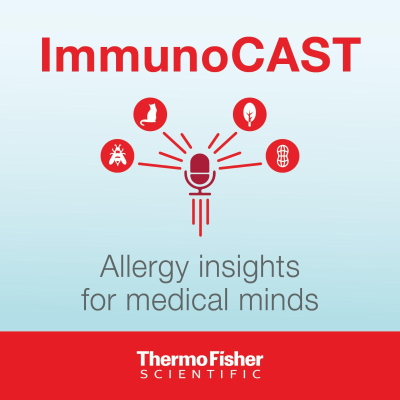
ImmunoCAST
Englisch
Kostenlos bei Podimo
Kostenlos hören bei Podimo
Starte jetzt und verbinde dich mit deinen Lieblingspodcaster*innen
- Vertraut von über 1 Mio. deutschen Hörer*innen
- Über 1.000 lokale Podcasts und Shows – nur bei Podimo
- Keine Zahlung nötig
Mehr ImmunoCAST
From medical guidelines and best practices to educational insights on specific disease states, ImmunoCAST is a podcast dedicated to providing healthcare providers of all specialties clinically relevant, easy-to-digest episodes on allergy related topics.
Alle Folgen
50 FolgenAdult Food Allergy in Primary Care: Practical Diagnosis, Pitfalls, and Management Strategies
Nearly 11% of U.S. adults meet criteria for a convincing food allergy, yet most clinicians underestimate both the prevalence and unique challenges of adult-onset disease. This episode addresses the frequent misdiagnosis and clinical uncertainty surrounding new symptoms in adults by highlighting epidemiology, risk factors for delayed and severe reactions, high-yield history-taking, diagnostic pitfalls, and guideline-supported use of specific IgE and component-resolved diagnostics. Listeners will learn to distinguish allergy from intolerance, understand psychosocial burdens, apply evidence-based testing algorithms, and recognize when to refer for oral food challenge or advanced management. With practical insights into differential diagnosis, best practices for test interpretation, and strategies to streamline care in busy settings, this episode equips providers to close the adult allergy diagnosis gap and optimize patient safety. Resources and references: https://www.thermofisher.com/phadia/us/en/resources/immunocast/adult-onset-food-allergy-diagnosis-management.html?cid=0ct_3pc_05032024_9SGOV4
Eczema Essentials: Diagnosing and Managing Atopic Dermatitis in Practice
For primary care providers, seeing a patient presenting with atopic dermatitis (eczema) is common, yet misconceptions persist regarding its underlying cause and optimal management. This episode tackles the critical clinical dilemma: when and how should specific IgE testing for food and environmental allergens shape routine eczema care? Key topics include the evolution of pathophysiology—shifting focus from allergy-driven disease to barrier dysfunction and type 2 inflammation—plus risk stratification, differential diagnosis, the role and interpretation of specific IgE tests, evidence-based guideline updates, environmental and food allergen impacts, targeted therapeutics, and practical patient counseling. Special attention is given to environmental triggers such as dust mites and pet dander and structured elimination diets. Clinicians will gain actionable insights on refining diagnostic workups, individualizing treatment plans, and supporting long-term disease control in pediatric and adult eczema populations. References and resources: https://www.thermofisher.com/phadia/us/en/resources/immunocast/eczema-essentials-atopic-dermatitis-diagnosis-management.html?cid=0ct_3pc_05032024_9SGOV4
What I Wish I Knew About Allergies When I Started Practicing Medicine
In this episode, we sit down with ImmunoCAST host Gary Falcetano, PA, to discuss the insights he wishes he had when he first began treating and managing allergy patients, along with the knowledge he has gathered from speaking with thousands of clinicians across the country. Gary addresses common misconceptions surrounding skin prick testing and in vitro blood testing, highlights region-specific allergen patterns, explores the nuances of risk stratification in asthma and respiratory allergies, and much more. Additional topics include pre-test and post-test probability, diagnostic test selection, patient communication, shared decision-making, adherence challenges, actionable exposure reduction, and effective use of clinical resources. Healthcare providers will come away with clear, evidence-based guidance to strengthen allergy diagnosis and improve patient outcomes. References and resources: https://www.thermofisher.com/phadia/us/en/resources/immunocast/allergy-insights-tips-advice-new-clinicians.html?cid=0ct_3pc_05032024_9SGOV4
Unmasking Winter Allergies and Indoor Triggers: Differential Diagnosis and Targeted Management for Healthcare Providers
Over 99% of homes contain at least one allergen, with 75% harboring three to six, yet winter allergies often masquerade as stubborn “colds” or recurrent respiratory infections. This episode confronts the core diagnostic challenge of differentiating allergy-driven symptoms from viral, bacterial, or non-allergic triggers in colder months. We delve into indoor allergen epidemiology, risk stratification for polysensitized patients, syndrome overlap in differential diagnosis, and utility of location-specific respiratory allergen profiles for diagnostic testing and interpretation. Additional topics include guideline-informed approaches to environmental exposure reduction, patient-centered therapeutic strategies, monitoring of symptom thresholds, actionable counseling for managing dust mites, pet dander, molds, mouse and cockroach allergens, and streamlining through tailored lab ordering guides and reflex pet component testing. Clinicians will gain practical insight into identifying sensitizations, guiding targeted exposure minimization, and elevating respiratory care quality for patients with persistent winter symptoms. Link to resources and references: https://www.thermofisher.com/phadia/us/en/resources/immunocast/indoor-allergens-winter-respiratory-symptoms-clinician-guide.html?cid=0ct_3pc_05032024_9SGOV4
What Should Primary Care Providers Know About Online Allergy Misinformation? (ft. Dr. Zachary Rubin)
In this episode, we tackle the challenge of separating allergy fact from fiction in an age of rampant online misinformation. Dr. Zachary Rubin, a double board-certified pediatrician and allergist, shares insights on common allergy myths circulating on social media. We explore misconceptions about food allergies vs. intolerances, respiratory allergies, eczema management, anaphylaxis treatment, and allergy testing interpretation. Learn how to navigate patient conversations about gluten sensitivity, pet allergies, and "natural" allergy cures. This episode provides primary care clinicians with practical strategies to address patient concerns rooted in online misinformation and optimize allergy diagnosis and management in clinical practice. For episode resources and references, visit: https://www.thermofisher.com/phadia/us/en/resources/immunocast/allergy-myths-social-media-clinical-practice.html?cid=0ct_3pc_05032024_9SGOV4















































